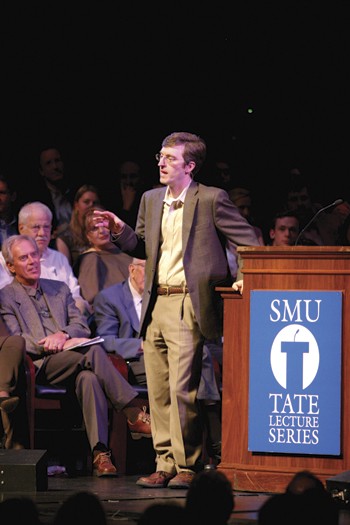
Steve Levitt, author of “Freakonomics,” speaks at the Tate Lecture on Tuesday night. (Christina Parrish)
Steve Levitt, innovative economist and co-author of “Freakonomics,” provided fresh insights to the application of standard economic theory in the modern world Tuesday evening at the TXU Electric Delivery Lecture.
Addressing unconventional subjects packed with ethical and moral landmines, including cheating, corruption and crime, Levitt entertained the audience by exposing conventional assumptions about how people and society function.
A graduate of Harvard and MIT, and, at age 32, the youngest tenured professor ever at the University of Chicago, Levitt applied economic theory to everything from inner-city gang infrastructure to the impact of legalized abortion on crime to crooked real-estate agents.
Levitt’s approach to and application of economic theory begs one to look beyond spreadsheets, computers and data, instead requiring someone to think intelligently about what the data is saying.
Once referred to as “The Indiana Jones of economics,” Levitt brings an unadulterated zeal to the world of economics – looking beyond the numbers for proof of a trend.
“I’ve always been good at discerning patterns,” he said.
Seemingly more of a storyteller than number-cruncher, Levitt encourages others to look beyond conventional wisdom and not to take things for granted – especially when it comes to application of economic theory.
According to Levitt, handing out surveys to gang members in housing projects is part of the job of an economist, in addition to being held at gunpoint to gather data – as was one of his co-writers.
Another untraditional approach Levitt has taken to teaching economics is asking $400-an-hour prostitutes to explain economic theory to an undergraduate class.. Explaining the meeting to his wife, he said, proved a much more daunting task.
Levitt admitted he was a horrible math student and said he had to master the art of arithmetic in order to achieve success in economics.
Contrary to the belief that the most important quality of a good economist is having a thorough knowledge of the economy, Levitt recalls learning at MIT that “70 percent of economists said proficiency in math is the most important quality of a successful economist.”
Levitt has turned turned down political appointments twice. During the Clinton administration, a position opened up on the council of economic advisors. However, this vacancy became available one month after the Lewinsky affair. Levitt was well aware that economic policy would no doubt be shifted to the back burner.
Under George W. Bush, Levitt was nominated to take part in a presidential advisory team on crime. Levitt waited three or four days, weighing his options. He finally called back to speak with the person who had offered him the job. Only this time, the woman no longer held a position within the administration.
Although he is an expert in what many consider a dry subject, Levitt approaches it with humor.
“Most of what I do is take conventional wisdom and poke fun at people for making mistakes,” Levitt said.








